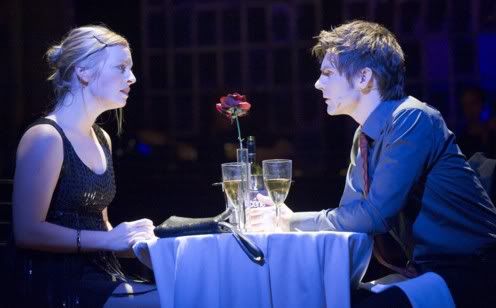Metro Street Review
Metro Street presented by The State Theatre Company of South Australia, in association with Arts Asia Pacific and Power Arts.
At the Dunstan Playhouse, 3 April - 25 April, 2009.
Book, music and lyrics by Matthew Robinson.

Jude Henshall and Cameron Goodall in Metro Street. Photo by Shane Reid.
So many musicals are about the big and the extraordinary, and the musical theatre scene in Australia is dominated by these large-scale musicals brought in as carbon-copies of the original West End or Broadway shows. Metro Street is a much quieter and more local affair, focusing on the lives of three generations of an Australian family in Melbourne suburb, and it is Matthew Robinson's ability to so perfectly articulate the place and the time of these people in his work which gives this piece its strength. The play is so Australian, and so much a reflection of our time, yet, it is also so universal in its themes; particularly themes of families and relationships, and how these change when we go through adversity.
The quietness of the piece is reflected in the set design, by Victoria Lamb, and the lighting design, by Geoff Cobham. The simple set design, which seemed to evoke images of an abandoned picture theatre, framed the four-piece band under the music direction of Matthew Carey, and worked as a simple piece to incorporate all locations, many simultaneously. At times, Robinson's book calls for several scenes to be running concurrently, and it is the incorporation of Lamb and Cobham's work which makes theses scenes easy to follow, even as the characters move throughout the performance space. During Phone Quintet, the five actors exist in five locations, individually illuminated under a square spotlight, taking each character on their own path in their own location, easily distinguishing the overlapping scenes.
Metro Street is the first professional production of a book musical by Robinson, a seasoned musical theatre actor, and he has tied together music and book seamlessly. With assistance from David Pritchard-Blunt's orchestrations, Robinson demonstrates his acute understanding of how a simple cord progression can change the mood of the entire audience. The music is technically very proficient. The aforementioned Phone Quintet has, at one stage, all five actors singing in counterpoint, and while individual melodies are hard to pick out, I never felt lost or muddled in the music. Robinson swings between musical styles with ease, yet from the upbeat and intensely funny Yes I Know to the quiet duet The Best Thing, a constant through line is maintained, bringing all the individual songs together in one thought.
The cast are given a lot to work with, and they take it all on with ease. Nancye Hayes and Verity Hunt-Ballard steal the show with their witty lines and perfect delivery, while Jude Henshall and Cameron Goodall put love and emotion into a relationship which has cracks in it from the very beginning. But the true standout performance of the night is Debra Byrne as Jo, a woman suffering through breast cancer treatment and a divorce, whose gut-wrenching eleven o-clock number Dignity, taking Bryne from a quite beginning through to the emotional and powerful ending, gives Byrne a opportunity to give one of the most intense and emotional experiences possible in a theatre.
Directed by Geordie Brookman, Metro Street is a true achievement for everyone involved, and it deserves to have a long life after the conclusion of its world premiere Adelaide run on April 25th. The world reflected in Metro Street is one where everyone will find someone they relate to or someone they recognise. I laughed and I cried, and I laughed through my tears. I was deeply moved by the piece, and I took a lot away from it. A repeated line from the show has been running through my head since I left the theatre: "Love is a tie, holding us together. It's not a lot but it's all that we have." Metro Street shows us how lucky we are to have these ties, and it's okay for that to be all that we have.